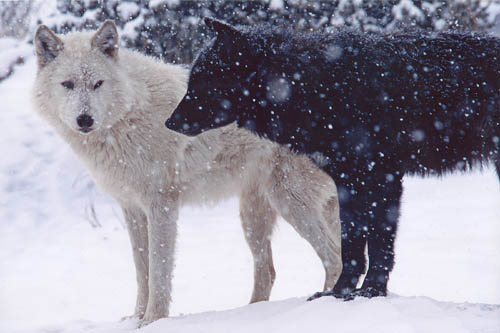The story's ending and lesson goes like this:
The old Cherokee simply replied, “The one you feed.”
Check the tag on that “Indian” story
âpihtawikosisân goes on to explain what's wrong with this seemingly innocuous legend:
Not only do they confuse non-natives about our beliefs and our actual oral traditions, they confuse some natives too. There are many disconnected native peoples who, for a variety of reasons, have not been raised in their cultures. It is not an easy task to reconnect, and a lot of people start by trying to find as much information as they can about the nation they come from.
It can be exciting and empowering at first to encounter a story like this, if it’s supposedly from your (generalised) nation. But I could analyse this story all day to point out how Christian and western influences run all the way through it, and how these principles contradict and overshadow indigenous ways of knowing. Let’s just sum it up more quickly though, and call it what it is: colonialsim.
And please. It does not matter if this sort of thing is done to or by other cultures too. The “they did it first” argument doesn’t get my kids anywhere either.
The replacement of real indigenous stories with Christian-influenced, western moral tales is colonialism, no matter how you dress it up in feathers and moccasins. It silences the real voices of native peoples by presenting listeners and readers with something safe and familiar. And because of the wider access non-natives have to sources of media, these kinds of fake stories are literally drowning us out.
As âpihtawikosisân notes, even the lesson isn't Native in style. A typical Native lesson would be more like, "There's good and bad in each of us. You need to balance both halves to achieve harmony." Which is markedly different from the Christian dichotomy of black and white, good and evil.
For more on Native values, see Western vs. Native Education and Europeans Hated Indians' Virtues.
Below: Good wolf and bad wolf.


Jesus didn't teach dualism - black/white, good/bad, etc. But many brands of Christianity do. They're wrong.
ReplyDelete"There's good and bad in each of us. You need to balance both halves to achieve harmony." Which is markedly different from the Christian dichotomy of black and white, good and evil. - somehow I think some natives might find that insulting... a little good "feeding someone starving", is best to balance with a little bad "raping someone".
ReplyDeleteAs far as I can tell, the good wolf in original cherokee might also be "balanced" one, the bad wolf also means "lack of balance", with similar ideas of helpful or harming emotions and spirit, and a bit of different style in how point of story is told. It is matter of how you understand each of the words, for one guy on internet "faith" in this story is showing a balanced trust, for another guy "faith" means gullible belief without evidence.
ReplyDeleteMatter of using the correct shade of meaning for each of words in the story, then it fits the common sense of most cultures.
Horse came from white man, does it polute cherokee culture?
Given that written word of cherokee only goes back 200 years, and much of white man culture like horse was adopted before then, do we even know what is originally native ideas rather than adopted from europe and asia?